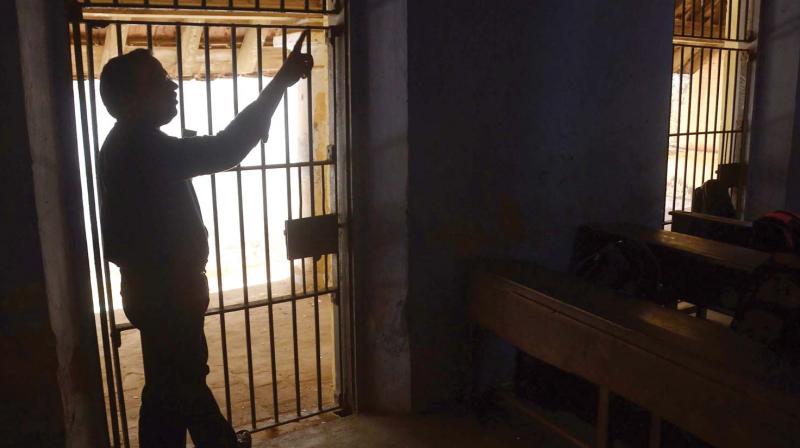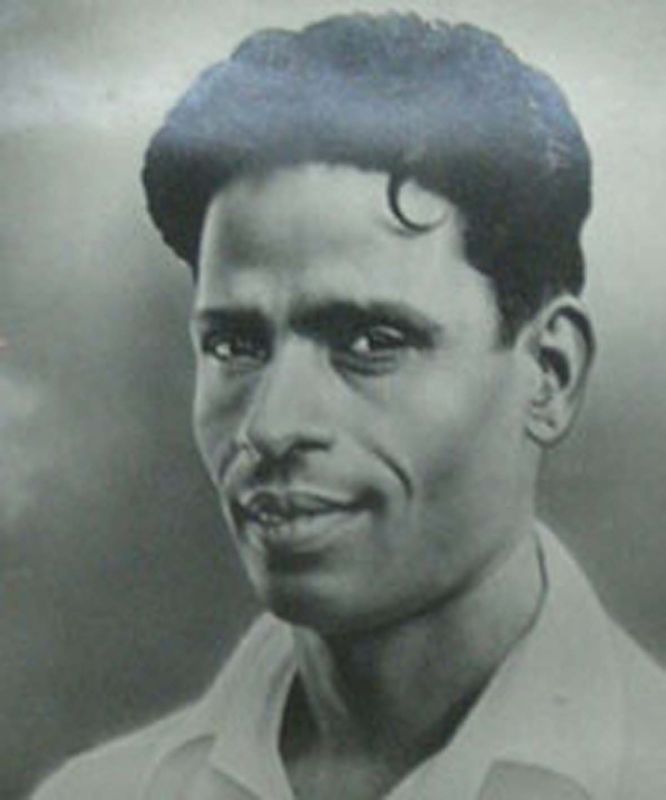Sakhavu' fell in love here
The story of Edalakudy Jail is not something that children would love to hear.

The once notorious jail where freedom fighters were tortured and killed at Edalakudy in Kanyakumari is now a school but it was also where ‘Sakhavu’ P Krishnapillai fell in love.
THIRUVANANTHAPURAM: Students of Sathavathani Sheikh Thambi Pavalar Memorial Government Higher Secondary School at Edalakudy near Nagercoil in Kanyakumari district may not think much about wide iron-bar doors that open with a heavy sound into their classrooms. They are blissfully unaware that during colonial rule revolutionaries were beaten to pulp within the very classrooms they now sit and learn. Also that in a room along the corridor, now their Physical Education Department, was the dungeon into which freedom fighters were hung to death.
It is as if these children, while inside the school, slip into a time warp. All that was dreadful about pre-Independence Indian prisons – the iron bar doors, the gallows, the dim corridors that pass along ‘cells’, and the round thick limestone columns at the edges of the corridor – are intact. But, unlike in science fiction, these children are not aware of the past. This historical disconnect seems fitting, too. The story of Edalakudy Jail is not something that children would love to hear.
The jail, then under the Madras Presidency, was a symbol of British tyranny. It was a referral centre where political prisoners who refused to be tamed in the torture chambers of Travancore jails were dumped.
The former headquarters of evil is now a school in the name of Sathavathani Sheikh Thambi Pavalar, one of the greatest Tamil poets. Perhaps the only thing poetic about the den of violence till the children came in with their smiles was the unlikely love story of the legendary comrade.
P Krishnapillai, the Communist revolutionary known to the masses simply as ‘Sakhavu’ (comrade), spent nearly one year in this historical jail. It was after the historic Morazha agitation in the erstwhile Malabar district that Krishnapillai was brought to Edalakudy. He was arrested on his return to Alappuzha in March 1942 and put in the Alappuzha Jail.
Jail authorities in Alappuzha often took a sadistic pleasure in torturing jail mates. They tried to impose their perversions on ‘Sakhavu’ and true to style he resisted. Krishnapillai then questioned the authority of the wardens to torture the inmates. When they tried to attack him, he retaliated. A minor revolt broke out with other inmates, too, joining him. Even the wardens sustained injuries. Finding that he was a ‘high-risk’ political prisoner, Krishnapillai was promptly shifted to the notorious Edalakudy Jail.
 P Krishnapilai
P Krishnapilai
The authorities at Edalakudy were wary of him to begin with but ‘Sakhavu’ won them over with his charm. Considered Communis-m’s most compelling evangelist, ‘Sakhavu’ inculcated Communist values in the jail staff and other inmates. He asked jail officers for books to read. A “five rupee” policeman (so called because those days policeman had a salary of '5) brought him books. These books were from Thankamma, a teenage girl in the neighbourhood. All her books were in Hindi. Sakhavu was well-versed in the language as he had spent his early life in North India.
He also began to exchange notes with Thankamma, all in Hindi; the five-rupee policeman acting as the go between. It was under the neem and berry trees, which continue to cast their cool shade for the children, that Krishnapillai is said to have penned his letters to Thankamma. The trees are in a medieval-style courtyard enclosed by the four sides of the building.
After a point, realisation struck. No one, including the cops, knew a word of Hindi. The notes sent out by Krishnapillai suddenly acquired a passionate flavour.
His letters throbbed with his intensity of feelings for both her and Communism. In no time, Krishnapillai acquired a comrade and lover. One of the letters the unsuspecting five-rupee policeman carried had these words in Hindi: "Life with me will be difficult, different. My wife should stand by me, the party and its cause. Then alone will she be happy".
The affair was once said to have inspired Vaikom Muhammad Basheer’s celebrated short story ‘Mathilukal’. Both Krishnapillai and Basheer hail from Vaikom.
What is common to both love stories is that they happen in jail. However, what separates Basheer’s love story from Krishnapillai’s is that while one was a tragedy about lovers who can never meet, the other had the lovers living together till Krishnapillai’s untimely death from snake bite at the young age of 42.
